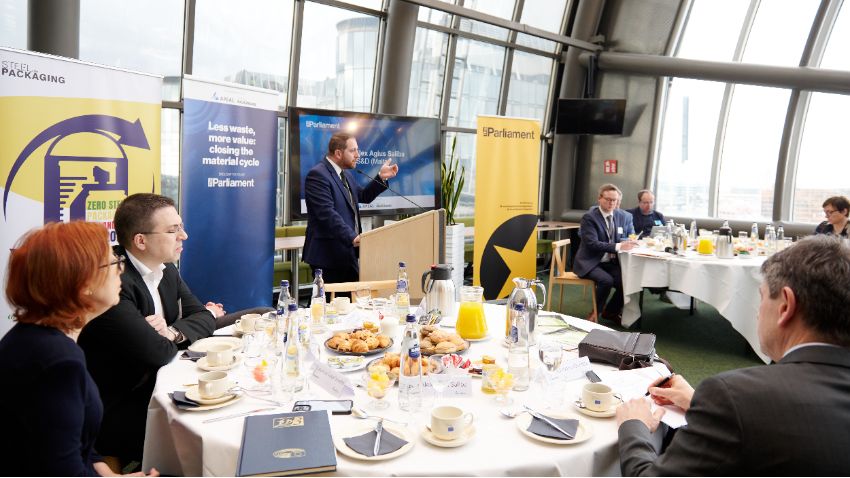With current targets seeking to reduce the amount of waste from packaging by 15% in 2040 compared to 2018 levels, packaging recycling is at the forefront of stakeholder and legislative minds.
The Parliament partnered with the Association of European Producers of Steel for Packaging (APEAL) to host a breakfast policy debate in the European Parliament to discuss how Europe can push to be a global packaging powerhouse.
Whilst reducing packaging waste is the overall objective of regulations, protection of the environment, innovation, jobs, criteria for recyclable packaging and packaging recyclability performance grades were among the points discussed by MEP Tomislav Sokol (Croatia, EPP), MEP Maria da Graça Carvalho (Portugal, EPP), MEP Alex Agius Saliba (Malta, S&D) and the European Commission’s Director for Circular Economy, DG ENVI, Mr Aurel Ciobanu-Dordea.
Reducing packaging waste at the forefront of plans
The Regulation’s ambition to reduce the amount of waste from packaging by 15% in 2040 compared to 2018 was an ambitious move highlighted by MEP Sokol. In the current text, Article 38 requires each EU Member State to progressively reduce the packaging waste generated per capita as compared to the 2018 figure by 5% by 2030, 10% by 2035 and 15% by 2040.
In addition to the impact of the Regulation in terms of reducing greenhouse gas emissions, a point emphasised by MEP Agius Saliba, a key message from MEP Sokol was not to focus on the minuses and costs of adapting to the Regulation. Instead, he argued that the Regulation provides an opportunity to look at the benefits in terms of innovation and job creation in the economy, particularly in the field of recycling.

The importance of the legislation as a Regulation [with direct effect on the legislation of EU Member States] rather than a Directive was emphasised by MEP Sokol as “the implementation of Directives in EU Member States varies to some degree and can lead to problems”. For him, improvements in the Regulation are needed in terms of standards of what is recyclable or not, clear rules on transport and clear rules on the creation of new waste.
“Make it simple for industrial players” was a key message from MEP Maria da Graça Carvalho, co-chair of an interparliamentary group on industry. With the EU facing pressure from countries like the US and China and emerging economies, she stressed the importance of creating a proper environment for industry to be competitive.
“We are losing investments to China and the US. If we only focus on the environment, the end result will be worse. If we deindustrialise and jobs shift to China, then China’s industry capacity will increase [and likely its emissions too]” – MEP Tomislav Sokol (Croatia, EPP)
Major industry player APEAL broadly welcomed the Regulation. APEAL’s President Luc Brantjes noted that the advantages of steel for packaging are its “long shelf-life (food or other products can be stored in a can for years), energy-free storage (there is no need for a fridge) and high recycling rate (85% in Europe)”. He added that all of APEAL’s members support the Green Deal, with carbon-neutral steel production very high up their agendas.
Packaging creation with recycling in mind
Inside the new Regulation, the Commission has defined criteria for recyclable packaging. Central to this is that packaging is designed for recycling, easy to sort and collect and the resulting secondary raw materials can substitute the primary raw materials.
Alexis Van Maercke, Secretary General of APEAL, said that APEAL supports this approach, but sees the need for secondary raw materials (e.g. steel scrap) to substitute the primary raw materials “not just once but multiple times”.
Introducing recyclability performance grades
The Commission has also introduced ‘packaging recyclability performance grades’. “The idea is that every packaging put on the market gets a grade based on its degree of recyclability,” said Mr Van Maercke. “We support this approach because it will boost innovation,” he said, whilst adding that some explanatory text about the conditions to be in, for example, Grade A or B, is missing.
Expanding further on the performance grades, Mr Aurel Ciobanu-Dordea explained that “if the system is embraced by the European Parliament and EU Member States as we have proposed it, we have foreseen to come with implementing rules, in a staggered way, after legislation is adopted”. He noted that the implementation rules will be supervised by the European Parliament and by EU Member States, but committees of experts will need to be consulted so there will be a public consultation before these implementing rules are adopted.
“The idea is that every packaging put on the market gets a grade based on its degree of recyclability. We support this approach because it will boost innovation”. - Alexis Van Maercke, Secretary General of APEAL
The topic of incentivisation and sanctions was discussed. MEP Sokol argued that the performance grades were best suited as a system of incentivising, encouraging bodies to have a positive environmental impact.
“We are losing investments to China and the US. If we only focus on the environment, the end result will be worse. If we deindustrialise and jobs shift to China, then China’s industry capacity will increase [and likely its emissions too],” he argued.
In concluding remarks, Mr Alexis Van Maercke said that the Regulation is timely and argued that its success can only be achieved through clear rules via primary legislation. “The Regulation should set minimum recyclability criteria which apply to all packaging that is put on the market,” he added, pointing out that all of this was needed to create a level playing field and legal certainty.
MEP’s Sokol and Agius Saliba along with Mr Ciobanu-Dordea were in favour of the EU working towards approving the legislation in 2023 ahead of the next European Parliament elections whilst highlighting the importance of making sure that the regulation is fit for purpose.
In partnership with

This article was produced in partnership with APEAL. APEAL is the association uniting the six producers of steel for packaging in Europe. Advocating steel packaging as the sustainable material for the future.
Sign up to The Parliament's weekly newsletter
Every Friday our editorial team goes behind the headlines to offer insight and analysis on the key stories driving the EU agenda. Subscribe for free here.